| This is the PHENIX global coordinate system, with +z=North, +y=up and therefore +x=West.
Global phi starts at x=0 and rotates toward +y.
| 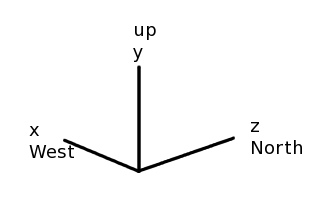
|
The quadrants are numbered from x=low, z=low to x=high, z=high. Therefore the quadrant numbers are:
quadrant location numeric
1 SW 00
2 SE 01
3 NW 10
4 NE 11
Cables, boards etc. can be labeled SWxxx through NExxx or 1xxx through 4xxx. For labeling purposes,
the SW-NE is clearer than 1-4 or 00-11, so I will pick this convention.
| 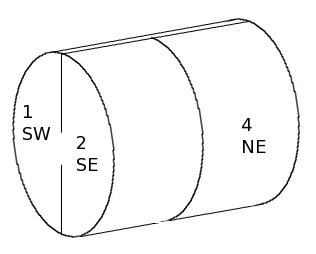
|
Next we have to decide on the numbering along the perimeter: top to bottom or v.v. The wedge
numbering on each half-disk proceeds in a clockwise direction when facing the upstream or downstream surfaces, so
that for quadrant 1 this is in the +phi direction for the downstream (-z) face, and -phi for the upstream (+z)
face. So wedge numbering does not give us a preferred direction.
However the ROC's themselves use numbering that runs in +phi when facing the board.
Therefore we choose the ROC and cable numbering such that
on the South side, ordering is along -phi, but in the North along the +phi direction.
In addition, in keeping with earlier rulings, we start counting at 0.
| 
|
ROC board numbering:
The ROC boards will come with their own production sequence numbers. Here we define the ROC board
position numbering. The orientation is as we would see the quadrant in the assembly fixture.
The sequence is as defined in the previous figure.
| 
|
| There is only one power connector per board, so following the same convention, these would be labeled
XXY-0, where XX is the quadrant (SW-NE) and Y is the ROC position.
| 
|
| There are 4 wedge power connectors (J1, J1A, J2, J2A), one for each of the 4 stations, respectively.
| 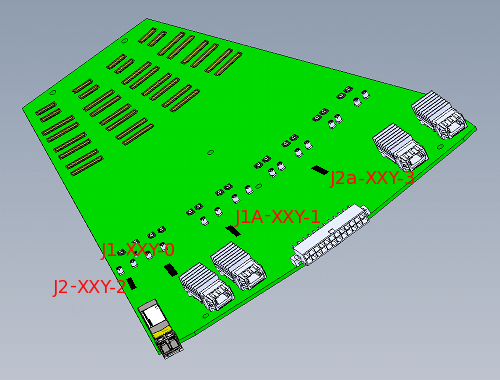
|
There are 4 fiber connections per ROC board. These are labeled
quadrant(SW-NE) - roc_position(0-5) - fiber_number(0-3).
The fiber labels would run from SW-0-0 through NE-5-3. Since all are numbers are single digits, we could omit the
hyphens, so the fiber labels could be shortened to SW00 through NE53.
A few pictures down I re-introduce the hyphen for the bias connectors. So for uniformity, I will use labels
XXY-n, where XX=SE-NW, Y=0-5.
| 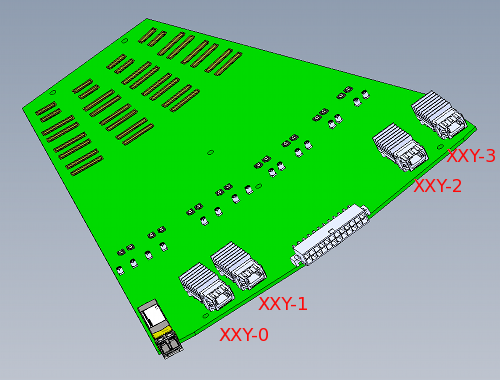
|
| There are 16 bias connectors on te board. The bias cables come in groups of 8, so there
are 2 bundles per ROC, labeled A and B, with individual bias cables labeled 1-8 in each bundle.
Labels run from SW0-0-A through NE5-15-B.
| 
|
| The slow-controls connector is labeled XXY-0 where XX is the quadrant (SW-NE) and Y is the ROC position.
Labels run SW0-0 through NE5-0.
| 
|
This shows station 2, in the same orientation as the previous figures. As can be seen, the wedge numbering
(starting with 0) starts with the 'upstream low' module (highlighted in green), followed by the downstream high (1),
upstream high (2, not visible in this view), and the fourth one is downstream low (3).
So for stations 2,3,4:
wedge ROC pos cable drawing
---------------------------------------------
0 1 1A 3x01 upstream/low
1 0 2A 3x02 downstrm/high
2 3 1B 3x03 upstream/high
3 2 2B 3x04 downstrm/low
---------------------------------------------
For station 1, exchange low←→high:
wedge ROC pos cable drawing
---------------------------------------------
0 1 1A 3201 upstream/high
1 0 2A 3202 downstrm/low
2 3 1B 3203 upstream/high
3 2 2B 3204 downstrm/low
---------------------------------------------
| 
|
| Data packet ID numbering follows ROC numbering:
| 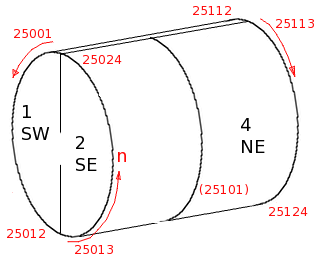
|










